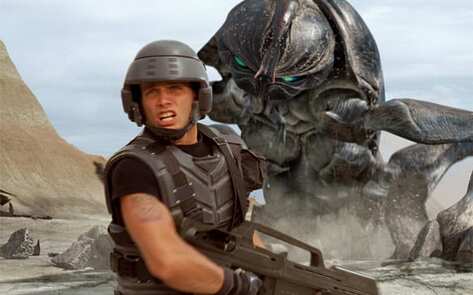|
I've decided to split this post into two parts because it was getting a bit long to read in one sitting. Writing about this topic dredged up alot of feelings and I needed some time to prune and tone-check what I wrote before putting it out into the world. Part one will mostly cover the background and context and part two will get deeper into my thesis. I plan on putting it up early next month to coincide a bit closer to the release of my next newsletter. Thank you for reading! John I like to see what’s trending in military science fiction. It doesn’t just behoove me to know the market, I’m also genuinely curious. As a fan and author of military science fiction and as a veteran, I feel steeped in both cultures and compelled to weight in some worrying trends that I’ve been noticing. They irk me because art does not exist in a vacuum. Like all art, fiction is a product and extension of the society that produces it.
You can see in newer military SF taglines and descriptions trending toward a bleak view of humanity. That’s not in itself a bad thing. I’m all for examining the ugliness of the military or expressing skepticism about humanity’s place in the stars. We’re all coping with the doomerism of our current time, and writing can be a powerful outlet. As a veteran, I have complicated feelings about my own experience in the military and as a civil citizen, I’m dismayed by America’s foreign interventionist tendencies. I would much rather that war be portrayed as the hell that it is and not some first-person shoot-em-up video game. One of my biggest concerns is that my own fiction might glamorize violence by portraying combat as an adventure. What I feel is lacking in much military SF these days is a sober realization of how horrific, tragic, and costly war truly is. Some people may feel averse to bringing politics into discussions about fiction and fandom, but as many have pointed out, science fiction is often an inherently political genre. Politics is not merely which political party you vote for but also how we civically engage with our neighbors and shape our society. It’s a reflection of our national goals and aspirations and a weather vane for our trajectory as a country. Science fiction has long made predictions, signaled warnings, and helped us dare to dream about societies far more fecund than the ones that we already know. The titles that are often celebrated in the military SF community, whether they be the classics or the modern bestsellers which they’re invariably compared to, often revolve around plots where military might is absolute, war is noble, and brutality is a virtue. Instead of war being the result of complex social and political differences between governments and civilizations, it’s a widget. Whatever the casus belli, they’re as intractable as they are contrived, and that’s by design. War is not just perpetual, it is the point. And while humans will never tire of killing other humans, the faster-than-light convention which is common in SF offers the possibility of taking the forever wars to the stars and killing nonhumans almost as a novelty. I could be internalizing some of the otherizing of the aliens in science fiction because I know what it feels like to be otherized. A hyphenated American in a country that paradoxically celebrates diversity while pressuring citizens to conform to some homogenized assumption of typicality. And while the “thems” in these stories aren’t always meant to be stand-ins for an ethnicity/race/nation/religion, we all know that they sometimes are based on how successful the author is in disguising the parallels. Authors like Tolkien warned his readers that his stories were not meant to be allegorical, but finding connections and looking for deeper meaning is what humans do. Art remains always open to interpretation. The individual artist might not even be aware of what their subconscious impulses or biases are. Oftentimes, outside observers point out recurring themes and motifs that the writer is blind to. I’m hoping one good rant can raise some eyebrows and generate some much-needed discussion. Military SF has been one of my favorite genres since I was young. I was even a military enthusiast before I enlisted in the Marine Corps. At a young age, I was seduced by warrior culture: martial arts, military history. Warrior edicts of honor and codes like chivalry and bushido seemed romantic and lofty. I could name the sleek, sexy fighter jets in my compendiums just by their silhouettes. I wonder if this preoccupation with militarism is uniquely American. We seem to have a national obsession with war as if it were a pastime. The worship of America’s warrior class is something which perhaps exploded in the days following September 11th, when we were painfully reminded of how vulnerable we are even here in self-isolation across the globe. Mass entertainment eagerly followed suit following 9/11, and it’s now impossible to keep track of the Michael Bay-esque blockbusters extoling America’s undeniable and virtuous might in what feel like two-hour commercials for the military. Some of this swaggering bravado could be seen earlier. The days of Ronald Reagan ushered in an idiosyncratic fusion of commercialism and militarism. Perhaps our tolerance for war is a vestige of our nation’s bloody history. A colonial nation that derived power and prestige from its ability to conquer and acquire land and resources from the less fortunate. It could be that the allure of violence is something intrinsic to human nature. There is something inherently seductive about war. Perhaps the taboo only adds to the appeal. It’s more than the rush from jumping out of an airplane or the false sense of power that we might get from taking a life. In the 2014 Esquire article "Why Men Love War," William Broyles, Jr. writes: “I miss it (the Vietnam War) because I loved it… in strange and troubling ways… I don't mean the romantic notion of war that once mesmerized generations raised on Walter Scott… it's not the mindless bliss of martyrdom that sends Iranian teenagers armed with sticks against Iraqi tanks. Nor do I mean the sort of hysteria that can grip a whole country… the way during the Falklands war the English press inflamed the lust that lurks beneath the cool exterior of Britain. That is vicarious war, the thrill of participation without risk, the lust of the audience for blood. It is easily fanned, that lust… Like all lust, for as long as it lasts it dominates everything else; a nation's other problems are seared away...” When it comes to military SF classics, Robert Heinlein’s Starship Troopers is the oft-cited example. While military science fiction existed before it, Starship Troopers (published in 1959) is a relatively recent entry when compared to the lesser-known examples from science fiction’s golden age. It came at just the right time, bridging the era between the pulps and the coming days of the literary new wave. Old enough to be a classic but young enough to feel modern. Because of Heinlein’s military background, it has an air of authenticity and feels grounded and well-referenced. It was written not only by a well-known author in the SF community, but a grand master. In Starship Troopers, Heinlein lays down a great deal of groundwork and invents some of the conventions that would become staples in military science fiction even today like orbital drop shock troops and mechanized “powered” armor. This one book is so iconic that I still find myself subconsciously imitating some of the style and flair that first wowed me when I read it as a kid. Naturally, I wasn’t picking up on the virulently reactionary politics that saturates every chapter. It wasn’t until later in my adult years whilst revisiting the book that I saw some of the not-so-subtle messaging. In the second chapter for example, Johnny Rico is being indoctrinated by his high school History and Moral Philosophy teacher, Mr. Dubois, who informs his class that the sentiment that “‘violence never settles anything’ is historically untrue and thoroughly immoral.” In Starship Troopers, violence is an expression of righteousness, and failing to practice violence is an act of depravity. It’s perhaps no surprise that the society the story takes place in, the Terran Federation, is a militaristic totalitarian state where service members and veterans are at the top of a rigidly-enforced social hierarchy. And that the book was written as a way for Heinlein to criticize Cold War America for not being sufficiently hawkish against the USSR and the looming red threat. The arachnids of Klendathu with their hive mind and lack of individuality are a thinly-veiled analog for godless communists. While the book disturbs me now as an adult veteran who’s much more civically conscious, I would never discourage anyone from reading it. If nothing else, it can still inspire new waves of military SF authors and discussions about civic responsibilities. What I do fear is that Heinlein’s conceits, which were reactionary in the 1950’s, are constantly lent legitimacy despite their gross anachronisms as his classic gets dragged kicking and screaming into the twenty-first century. And if Starship Troopers is a spiritual great-grandfather to my writing, it’s a literary ancestor for the vast majority of military SF out there now. As disturbing as it is to use mindless bugs as a stand-in for an ideology, I get the odious impression that some authors use this convention as a way to dehumanize groups of people in fictionalized form. Genocide (or xenocide as it’s called in Orson Scott Card’s Ender’s Game series) is how the literary hero Ender Wiggin ultimately defeats bug-like alien antagonists called the Formics. Genocide is also how humans defeat an alien species unremarkably called Bugs in The Shiva Option by David Weber and Steve White. Naturally, not every military SF story depicts genocide, but we begin to see an alarming trend here. Whatever the reasons for the conflicts, aliens are undeserving of sympathy but rather worthy of our hatred and disgust. These resolutions are a convenient in-universe “fix” for a problem which authors perennially create themselves because convenience or unoriginality, and one that we must never warm towards.
0 Comments
|
Author
Jonathan E. Hernandez is a science fiction writer and visual artist who decided to pursue a career better suited to his muses after an honorable discharge from the military. His first novel, ONE DAY AS A LION, debuts March 2, 2021 with Aethon Books. A Nuyorican originally from the Bronx, he now lives in Astoria, New York with his partner Anita and a cat named Jonesy. Archives
September 2021
|


 RSS Feed
RSS Feed
